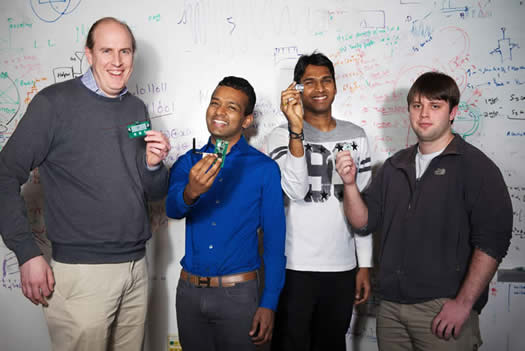News & Events
Passive Wi-Fi Named Breakthrough Technology of 2016
 |
The Passive Wi-Fi research team: faculty Joshua Smith and Shyam Gollakota and graduate students Vamsi Talla and Bryce Kellogg, from left.
|
A new Passive Wi-Fi system developed by a team of UW researchers has been named one of the top 10 breakthrough technologies of 2016 by MIT Technology Review. The Passive Wi-Fi system, which uses 10,000 times less power than conventional methods, not only saves the battery life of devices such as smartphones and computers, but also may enable the Internet of Things by connecting everyday objects to the Internet.
Led by EE Adjunct Faculty member and assistant professor of computer science & engineering Shyam Gollakota, the project also involves associate professor of electrical engineering and computer science & engineering Joshua Smith and graduate students Vamsi Talla and Bryce Kellogg.
By consuming relatively little power, the Passive Wi-Fi system saves the battery life of various devices, which are drained by most Wi-Fi systems. Passive Wi-Fi also uses 1,000 times less power than existing energy-efficient systems, such as Bluetooth Low Energy.
Passive Wi-Fi has the ability to impact the Internet of Things, which connects everyday objects to the Internet, allowing battery-free household devices and sensors to communicate. By adding sensors to everyday objects, the goal is to better monitor specific areas, from health to infrastructure. Until now, the implementation of the Internet of Things has been limited by communication and power issues.
The team’s research paper will be presented in March 2016 at the 13th USENIX Symposium on Networked Systems Design and Implementation.
Congratulations to Shyam, Joshua, Vamsi and Bryce!
See Also:





